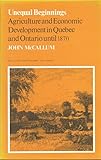Unequal Beginnings : Agriculture and Economic Development in Quebec and Ontario until 1870 / John McCallum.
Material type: TextPublisher: Toronto : University of Toronto Press, [1987]Copyright date: ©1980Description: 1 online resource (246 p.)Content type:
TextPublisher: Toronto : University of Toronto Press, [1987]Copyright date: ©1980Description: 1 online resource (246 p.)Content type: - 9780802063625
- 9781442682894
- 338.1/09713
- HD1790.O6 M33 1980eb
- online - DeGruyter
| Item type | Current library | Call number | URL | Status | Notes | Barcode | |
|---|---|---|---|---|---|---|---|
 eBook
eBook
|
Biblioteca "Angelicum" Pont. Univ. S.Tommaso d'Aquino Nuvola online | online - DeGruyter (Browse shelf(Opens below)) | Online access | Not for loan (Accesso limitato) | Accesso per gli utenti autorizzati / Access for authorized users | (dgr)9781442682894 |
Browsing Biblioteca "Angelicum" Pont. Univ. S.Tommaso d'Aquino shelves, Shelving location: Nuvola online Close shelf browser (Hides shelf browser)

|

|

|

|

|

|

|
||
| online - DeGruyter Under the Radiant Sun and the Crescent Moon : Italo Calvino's Storytelling / | online - DeGruyter Understanding Abuse : Partnering for Change / | online - DeGruyter Understanding and Being : The Halifax Lectures on Insight, Volume 5 / | online - DeGruyter Unequal Beginnings : Agriculture and Economic Development in Quebec and Ontario until 1870 / | online - DeGruyter Unfinished Dreams : Community Healing and the Reality of Aboriginal Self-Government / | online - DeGruyter Unforeseen Legacies : Reuben Wells Leonard and the Leonard Foundation Trust / | online - DeGruyter Unions in the Time of Revolutions : Government Restructuring in Alberta and Ontario / |
restricted access online access with authorization star
http://purl.org/coar/access_right/c_16ec
By the time of Confederation Ontario's economic lead over Quebec had been well established. John McCallum shows that the origins of this lead had little to do with the conservatism of the habitants and the church in Quebec, little to do with any anti-industrial bias of the Montreal merchants, and nothing to do with Confederation. Rather the origins lay in the wealth provided by Ontario's superior agricultural land.During much of the first part of the nineteenth century Ontario farmers were more specialized in wheat-growing than the twentieth-century farmers of Saskatchewan, and when the market conditions changed in the 1860s the province was able to use the capital derived from wheat to shift to other lines of production. The Quebec farmers, lacking both the virgin land of Ontario and the growing markets of the northeastern United States, were unable to find profitable substitutes for wheat. As a result, the cash income of the average Ontario farmer was at least triple that of his Quebec counterparts in the years before Confederation, and this enormous difference had profound effects on economic development in other sectors of the economy.In Ontario the growth of towns, transportation facilities, and industry was inextricably linked to the province's strong agricultural base. In Quebec little development occurred outside Montreal and Quebec City. Montreal industrialists did have several advantages; yet Quebec industry could not possibly absorb the province's surplus farm population. Ontario's wheat boom provided the capital which permitted Ontario industry to evolve in the classic fashion; indeed, Ontario wheat may be a rare instance of a staple whose surplus was retained in the producing area.John McCallum's analytical and historical account of economic patterns that persist today makes a solid and original contribution to Canadian economic history.
Mode of access: Internet via World Wide Web.
In English.
Description based on online resource; title from PDF title page (publisher's Web site, viewed 01. Nov 2023)


